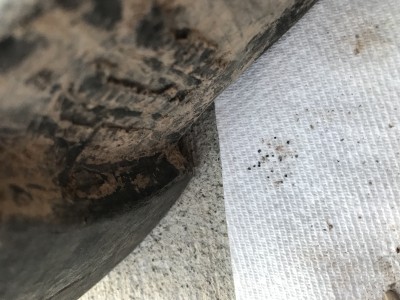The Muddy Boot Weed Seed Dispersal Method
Joshua Putman, Field Crops and Forage Specialist
Southwest New York Dairy, Livestock and Field Crops Program

Tall waterhemp is one of the most problematic weed species throughout the Midwest and has now arrived and spread to eight counties in Upstate New York. Waterhemp can spread from field-to-field and farm-to-farm on equipment, clothing, application equipment, or via water from over flooded ditches and rivers. Following a recent field day event we wanted to demonstrate the amount of weed seed that could travel back with you.
Boots that were considered "clean" were not as clean as we had thought (Figure 1). A knife was used to clean the boots and break up any hard clots that were present. Once the boots were clean, tweezers were used to separate the weed seeds from the dirt (Figure 2). We then separated out the pigweed/waterhemp seed from other weed seeds that were present and pigweed seeds were counted (Figure 3). We also double checked the dirt and found one pigweed seed stuck to a clay particle (Figure 4). Math was then conducted to estimate a 3 year establishment of waterhemp assuming 50% of the seeds were waterhemp and 100% were waterhemp, respectively.
The math is seen below:
16 pigweed seeds + 1 pigweed seed hiding in soil = 17 pigweed seeds from 2 boots.
Assuming only half of those are waterhemp and it can produce 250,000 seeds per female plant: 17/2 = 8.5 X 250,000 = 2.125 million seeds the following year in a field.
Assuming every seed on the bottom of the boots are waterhemp: 17 X 250,000 = 4.250 million seeds the following year.
Assuming 75% survival rate and reproduction in year 2: 4.250 million X 75% = 3.1875 million plants X 250,000 seeds per plant =
**796,875,000,000 seeds going into the soil in year 3 (potentially)
In conclusion, correct and early identification is very important; learn the correct features. Proper cleaning and sanitation of equipment, clothing, and vehicles can help prevent spreading. Intense management and continuous scouting are vital to eradication of this weed species. Mechanical control such as plowing can bury the seed deep which might decrease seed bank numbers.
Upcoming Events
WNY Pastureland Conversion & Soil Health Field Day
July 16, 2025
Middleport, NY
Join American Farmland Trust for the Western New York Soil Health Field Day on July 16, 2025, at Zeliff Farm in Middleport, NY, from 9:00 AM-3:15 PM. Learn about pasture conversion, soil health benchmarking, biochar in grazing systems, and best grazing practices. Plus, enjoy hands-on demos with the NY Soil Health Trailer, drones, and cover crops! Check out the attached agenda for more information about the field day and REGISTER HERE. Zeliff Farms is a regenerative beef operation who has recently partnered with AFT on outreach and education to farmers including learning circles and evaluating biochar effects on soil health.
IPM Strategies to Protect Corn and Soybean Seed in NY
July 30, 2025
Hamburg , NY
SWNYDLFC and Cornell IPM are hosting a grower meeting to discuss integrated pest management strategies for protecting corn and soybean seed in New York.
FAMACHA Training for Sheep and Goat producers in Woodhull NY
August 13, 2025 : FAMACHA Training in Woodhull
Woodhull, NY
Join us for a discussion and hands-on training for internal parasite integrated pest management in sheep and goats. Certification is available to all students participating in the workshop.
Announcements
No announcements at this time.





